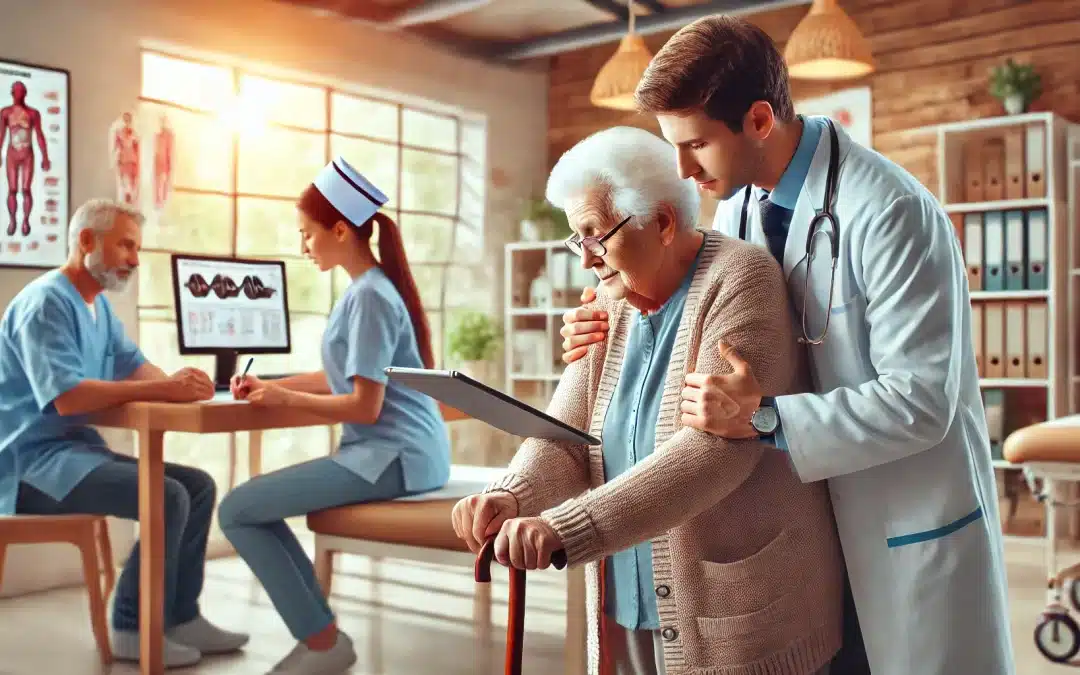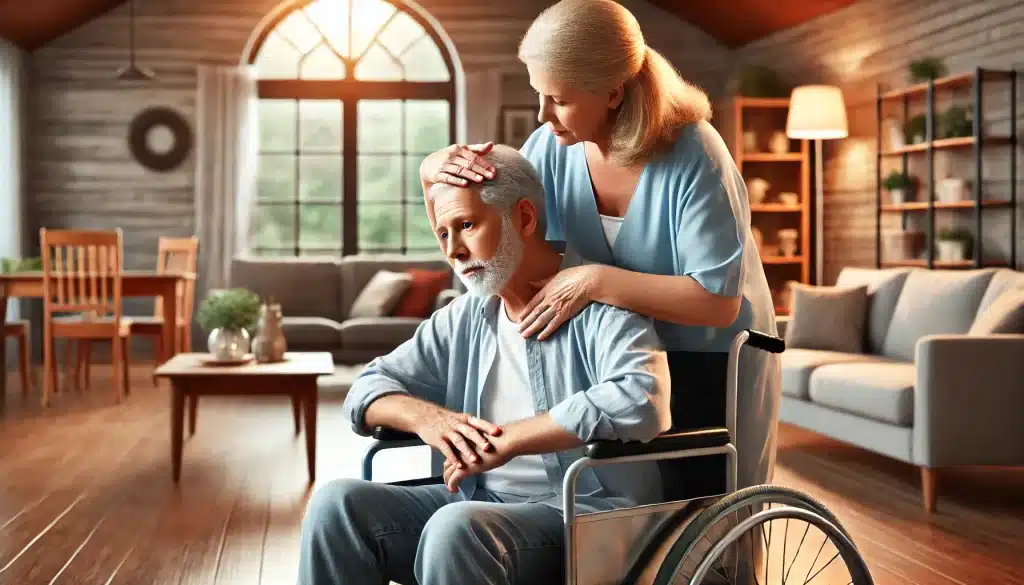
Oct 17, 2024
As the sun sets on a lifetime of hard work and contributions, Israel ensures that its senior citizens are rewarded with a host of Senior Benefits designed to enhance their financial well-being and quality of life. From tax relief and healthcare perks to cultural discounts and legal aid, there’s a wealth of opportunities awaiting those in their golden years.
In this engaging guide, we’ll explore the myriad benefits available to seniors in Israel, providing you with the information you need to make the most of this rewarding stage of life.
The Story of Leah: Finding Her Way to the Golden Senior Benefits
Leah Cohen, a 68-year-old retiree living in Tel Aviv, had always heard about the senior benefits available to seniors in Israel but found the details overwhelming. She had worked hard her entire life, raising her children, contributing to the community, and managing her household. Now, with her children grown and her days free, Leah wanted to make the most of her retirement, but she didn’t know where to start.
One day, while having coffee with a friend, Leah learned about the tax relief on pensions and discounts for public transportation that her friend was using to make her own retirement more comfortable. Inspired, Leah decided to dive deeper and see what benefits she could access.
Through research and a bit of help from her family, Leah discovered that she was eligible for multiple perks. These included tax exemptions on her pension, discounts on her municipal Arnona tax, and even lower payments for prescription medications. In just a few weeks, Leah managed to reduce her monthly expenses significantly, leaving her with more financial freedom to enjoy her passions—like traveling around Israel to visit her grandchildren and exploring cultural landmarks.
Just like Leah, many seniors in Israel may not realize the full extent of the benefits available to them. Let’s take a detailed look at these opportunities and how you can make them work for you.

1. Tax Senior Benefits on Pension and Other Funds
Tax Exemptions on Pension Income
After years of contributing to the workforce, seniors can enjoy significant tax relief on their pension income.
Eligibility Criteria:
- Men aged 67 and above.
- Women aged 62 and above.
How to Apply:
- Submit Form 161D (טופס 161ד) to the Israeli Tax Authority.
- Provide documentation of pension income from your pension fund or employer.
- Attach a copy of your ID (Teudat Zehut).
Benefits:
- Tax Exemption of up to 52% of the average wage on pension income.
- Reduces taxable income, leading to substantial tax savings.
Real-Life Example:
- Monthly Pension Income: ₪10,000.
- Tax-Exempt Amount: ₪6,255.60 (52% of the average wage).
- Taxable Income: ₪3,744.40.
- Monthly Tax Savings: Approximately ₪766.
Withdrawals from Provident Funds
Access your hard-earned savings with favorable tax conditions.
Eligibility Criteria:
- Reached retirement age (67 for men, 62 for women).
- Funds saved for at least 15 years or meet conditions under Section 190.
How to Apply:
- Submit a withdrawal request to your provident fund.
- Provide proof of age and duration of savings.
- Obtain a tax exemption or reduced tax rate certificate from the Tax Authority if required.
Benefits:
- Reduced Tax Rate: Withdrawals taxed at 15% on real (inflation-adjusted) gains.
- Significant tax savings compared to standard rates.
Real-Life Example:
- Provident Fund Balance: ₪500,000.
- Real Gain: ₪100,000.
- Tax Due: ₪15,000 (15% of ₪100,000).
- Potential Tax Savings: Up to ₪32,000.
2. Tax Senior Benefits for Working Seniors
Additional Tax Credit Points
Stay active in the workforce and enjoy extra tax relief.
Eligibility Criteria:
- Seniors working beyond retirement age.
How to Apply:
- Inform your employer of your eligibility.
- Complete Form 101 annually or when starting new employment.
- Freelancers should adjust tax calculations or consult a tax advisor.
Benefits:
- Receive 1.5 additional tax credit points.
- Annual Savings: ₪4,176 (based on 2024 credit point value).
Real-Life Example:
- Annual Income: ₪120,000.
- Monthly Increase in Net Income: Approximately ₪348.
National Insurance Contributions
Seniors employed beyond retirement age benefit from reduced National Insurance contribution rates, allowing them to retain more of their income.
Eligibility Criteria:
- Seniors who have reached retirement age.
Contribution Reduction:
- 3.1% on income up to 60% of the average wage.
- 12% on income above that threshold, compared to higher rates for younger employees.
Real-Life Example:
- Monthly Salary: ₪10,000.
- Average Wage: ₪12,030.
- Calculation:
- Up to 60% of average wage (₪7,218): 3.1% of ₪7,218 = ₪223.76.
- Remaining income (₪2,782): 12% of ₪2,782 = ₪333.84.
- Total Monthly Contribution: ₪557.60.
Impact on Bottom Line: Significant savings compared to the regular contribution rates for younger employees.
3. Property-Related Tax Senior Benefits
Capital Gains Tax Exemptions
Selling your primary residence? You might be exempt from capital gains tax.
Eligibility Criteria:
- The property is your only residence.
- Owned the property for at least 18 months.
- Haven’t sold another residence tax-exempt in the last 18 months.
- Resident of Israel.
How to Apply:
- File a Declaration of Sale with the Tax Authority within 30 days of the sale.
- Provide documentation proving primary residence status.
- Submit any additional forms as required.
Benefits:
- Full Exemption on capital gains tax for eligible sales.
- Potential savings of hundreds of thousands of shekels.
Real-Life Example:
- Sale Price: ₪2,000,000.
- Purchase Price: ₪800,000.
- Capital Gain: ₪1,200,000.
- Potential Tax Savings: Up to ₪300,000.
Leah’s Joyful Discovery of Cultural Discounts
Once Leah had sorted out her finances, she turned her attention to enjoying her newfound freedom. She learned that her senior citizen card gave her significant discounts at museums, theaters, and even the national parks she’d always wanted to explore. One sunny Sunday, Leah decided to take advantage of these perks by visiting the Israel Museum in Jerusalem. With a 50% discount on the entry fee, she found herself wandering through the exhibits that had long intrigued her but always felt a bit too indulgent to visit.
Later that month, Leah even treated herself to a discounted theater performance, enjoying an evening of culture without the financial sting. These experiences made her realize that the senior benefits available weren’t just about cutting costs—they were about opening doors to experiences she might have otherwise overlooked.
For seniors like Leah, these cultural and leisure discounts are an excellent way to enrich life during retirement, bringing joy and connection to a lifetime of well-earned relaxation.
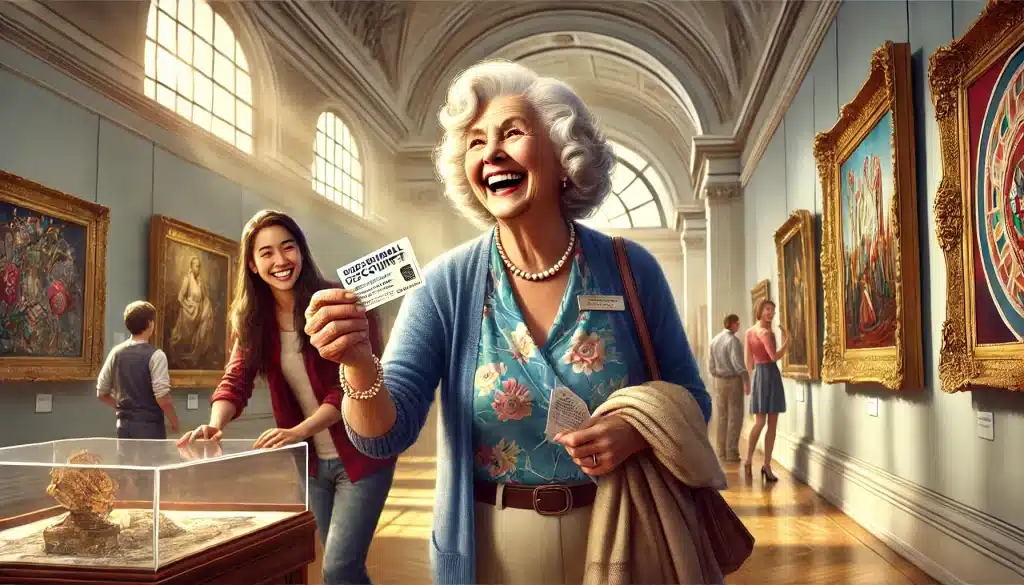
4. Other Financial and Legal Senior Benefits
Municipal Tax (Arnona) Discounts
Cut down on household expenses with Arnona discounts.
Eligibility Criteria:
- Women aged 62 and above.
- Men aged 67 and above.
- Income below municipality thresholds.
How to Apply:
- Contact your local municipality or visit their website.
- Submit the required application with proof of age and income.
- Provide additional documentation if requested.
Benefits:
- Discounts ranging from 30% to 100%.
- Substantial annual savings.
Real-Life Example:
- Annual Arnona Bill: ₪4,000.
- Discount Received: 70%.
- Savings: ₪2,800 annually.
Healthcare Senior Benefits
Access essential health services at reduced costs.
Benefits:
- Reduced Medication Co-payments: Up to 50% off on prescription medications.
- Preventive Services: Free or discounted flu vaccinations.
- Specialized Care: Access to geriatric specialists and rehabilitation services.
- Dental Care Discounts: Reduced rates for dental treatments (varies by health fund).
How to Access:
- Contact your Kupat Holim (health fund) for specific senior benefits.
- Present your senior citizen card or ID when receiving services.
Legal Aid Services
Secure your legal affairs with professional assistance.
Eligibility Criteria:
- Age 60 and above.
- May need to meet income criteria for certain services.
How to Apply:
- Contact the Legal Aid Department.
- Schedule an appointment at a Legal Aid Bureau.
- Bring necessary documentation.
Services Provided:
- Legal consultation.
- Assistance with wills, power of attorney, and medical directives.
- Representation in legal proceedings.
5. Additional Perks and Discounts
Public Transportation Discounts
Travel more for less with significant fare reductions.
Eligibility Criteria:
- Women aged 62 and above.
- Men aged 67 and above.
How to Access:
- Visit a Rav-Kav Service Center.
- Present your ID card (Teudat Zehut).
- Request the senior citizen profile on your Rav-Kav card.
Benefits:
- 50% Discount on buses, trains, and light rail.
- Savings on single rides and monthly passes.
Summary Table of Senior Benefits in Israel
| Benefit |
Description |
Eligibility |
Potential Savings |
| Tax Exemptions on Pension Income |
Up to 52% exemption on pension income |
Men 67+, Women 62+ |
~₪766 monthly |
| Provident Fund Withdrawals |
Reduced tax rate of 15% on real gains |
Men 67+, Women 62+, 15+ years of savings |
Up to ₪32,000 total |
| Additional Tax Credit Points |
1.5 extra points for working seniors |
Seniors working beyond retirement age |
₪4,344 annually |
| National Insurance Contributions |
Reduced contribution rates for working seniors |
Seniors working beyond retirement age |
Significant monthly savings |
| Capital Gains Tax Exemptions |
Exemption when selling primary residence |
Men 67+, Women 62+, owned 18+ months |
Up to ₪300,000 |
| Public Transportation Discounts |
50% off fares on buses, trains, and light rail |
Men 67+, Women 62+ |
Varies |
| Cultural Discounts |
Discounts at museums, theaters, and national parks |
Senior citizen card holders |
50% off entry fees |
| Arnona Tax Discounts |
Discounts on municipal property tax |
Income below municipality thresholds |
Varies |
| Healthcare Senior Benefits |
Reduced co-pays and specialized care |
Seniors registered with Kupat Holim |
Varies |
| Legal Aid Services |
Free or subsidized legal assistance |
Age 60+ and income criteria |
Significant legal savings |
| Employment Assistance |
Career counseling, job search assistance, and training |
Seniors looking for work |
Up to ₪2,000 (compared to private) |
| Caregiver Tax Senior Benefits |
Up to 2 extra tax credit points for caregivers |
Caring for dependent seniors |
₪5,568 annually |
Conclusion
Israel’s commitment to its senior citizens is evident through the extensive senior benefits and support systems in place. By taking advantage of these opportunities, seniors can significantly enhance their financial stability and enjoy a richer quality of life—just like Leah did.
Next Steps:
- Stay Informed: Regularly check official websites for updates.
- Consult Professionals: Seek personalized advice from tax advisors and relevant authorities.
- Take Action: Apply for senior benefits and programs to maximize your entitlements.
Embrace this rewarding chapter with confidence, knowing that a network of support awaits you.
How We Can Help
Navigating the different tax, financial, and legal senior benefits available for seniors in Israel can be overwhelming, and missing out on entitlements could mean missing significant financial support. At “Happy Seniors,” we are committed to making this process easier by offering personalized guidance tailored to the unique needs of seniors and their families. We provide assistance with applications for tax exemptions, municipal discounts, pension benefits, and more—ensuring you receive all the benefits you deserve.
Our experienced team helps clarify eligibility criteria, navigate bureaucratic procedures, and fill out the required forms to make accessing these benefits as straightforward as possible. Whether it’s securing a municipal tax discount, maximizing pension exemptions, or understanding the impact of your senior benefits on retirement planning, we’re here to help you every step of the way.Contact Us:
At “Happy Seniors,” our mission is to support families by managing the process of obtaining government funding for elderly care. We also provide emotional support to families and help them find the most suitable setting for their loved ones. Our goal is to ensure that your loved ones receive the highest quality care in the most appropriate environment, along with the financial assistance they deserve.
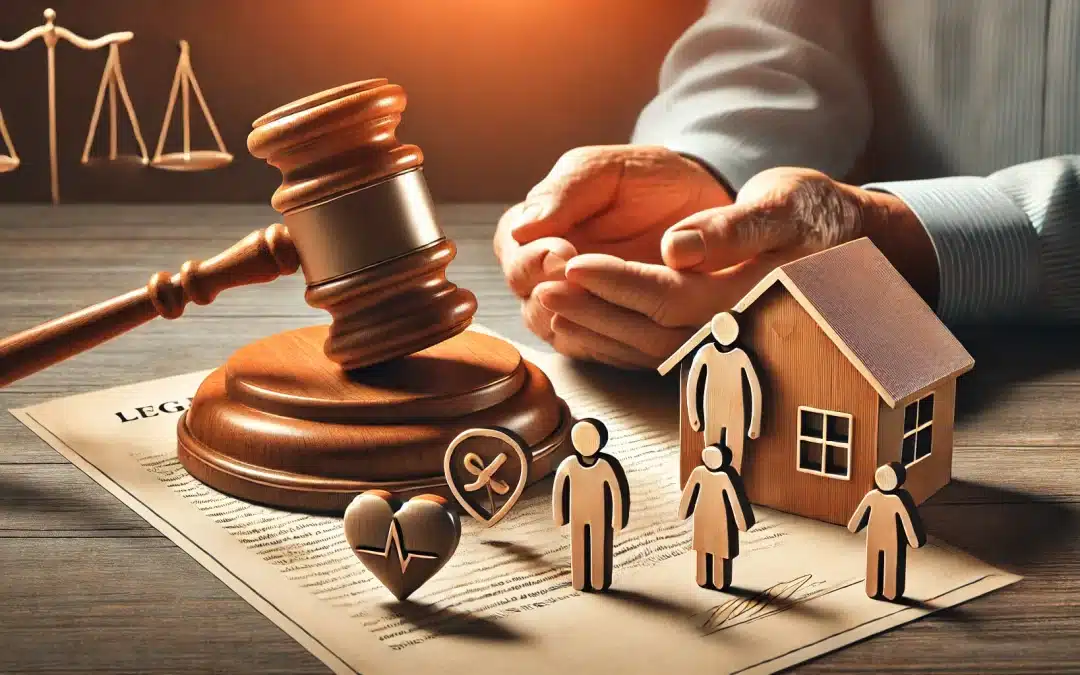
Oct 14, 2024
Guardianship is a legal process designed to protect individuals who are unable to manage their own affairs, whether due to age, medical condition, or other circumstances. In Israel, this process is regulated by the Legal Capacity and Guardianship Law, 1962, with the goal of ensuring the welfare of the wards and protecting their rights.
Key Concepts and Terms
- Guardian: An individual or entity appointed by the court to manage the personal, medical, or financial affairs of someone who is unable to do so themselves (the ward). The guardian’s role includes making decisions on behalf of the ward, considering their best interests and wishes as much as possible.
- Ward: A person who has been declared by the court as incapable of managing their affairs, thus requiring the appointment of a guardian.
- Durable Power of Attorney: A legal document that allows a person to appoint someone to act on their behalf in the future, should they become unable to make decisions themselves. This is an alternative to appointing a guardian, allowing the individual to plan ahead for the future.
Why Is Guardianship Necessary?
Guardianship is intended to protect vulnerable individuals, such as:
- Elderly people with dementia
- Individuals with mental or physical disabilities
- Minors without parents
- People with complex medical conditions
Without a guardian, these individuals may be at risk of exploitation, neglect, or violation of their basic rights. A guardian ensures that the ward receives the care, support, and protection they need.
The Appointment Process
Following are the required steps for the process
- Filing a Petition with the Court:
- The process begins by submitting a petition to the Family Court or Magistrate’s Court.
- The petition can be filed by family members, welfare authorities, or anyone concerned with the ward’s welfare.
- A court fee must be paid when filing the petition.
- Attaching Supporting Documents:
- The petition must include up-to-date medical documents (no older than 6 months).
- Professional opinions from a psychiatrist, geriatrician, or neurologist, as applicable.
- A social worker’s report, if relevant.
- Certificates proving the need for the appointment of a guardian.
- Court Hearing:
- The court examines the petition and hears the involved parties.
- Sometimes, the court appoints an investigator to examine the circumstances.
- The proposed ward has the right to express their opinion, if they are capable of doing so.
- Appointment of a Guardian:
- If the court is convinced of the need, it appoints a suitable guardian for the ward.
- The decision takes into account the personal relationship and the ability of the guardian to fulfill the role.
- The court defines the scope of the guardian’s powers.
- Receiving an Appointment Order:
- After the decision, the court issues an official appointment order.
- The guardian must declare before the court their willingness to fulfill the role.
- Registration and Reporting:
- The guardian must register with the General Guardian.
- Periodic reports must be submitted on the ward’s condition and the management of their affairs.
Handling Extreme Cases
- Lonely Individuals:
- In cases where an individual has no family, welfare authorities or the General Guardian can apply to the court.
- Sometimes, a professional guardian or a public body, such as “The Foundation for Care of Wards,” is appointed.
- Hospitalized Individuals:
- The medical staff can initiate the guardianship process through the hospital’s social worker.
- In urgent cases, a temporary appointment can be requested until a full court hearing.
- Individuals in Geriatric/Rehabilitation Institutions:
- The institution can assist in initiating the process for appointing a guardian, in cooperation with the family or authorities.
- A professional opinion from the institution’s care team must be attached.
- Individuals Unable to Make Decisions (e.g., suffering from dementia):
- A detailed medical opinion proving the inability to make decisions is required.
- The extent of impairment in decision-making ability should be assessed, and the scope of guardianship adjusted accordingly.
- Minors without Parents:
- Welfare authorities or family members can request the appointment of a guardian.
- The best interests of the minor should be considered, preferably appointing a family member when possible.
Rights of the Ward
It is important to remember that even after the appointment of a guardian, the ward has rights:
- The right to express their wishes and opinions.
- The right to receive information about their affairs.
- The right to request the court to change or revoke the guardian’s appointment.
Alternatives to Guardianship
- Durable Power of Attorney: Allows a person to appoint someone in advance to handle their affairs in the future, if they become unable to do so themselves. The durable power of attorney takes effect only when the individual loses their decision-making capacity, providing flexibility and control over their future.
- Supported Decision-Making: A model aimed at helping an individual make decisions as independently as possible, with support from a social network or a person who assists them. The support focuses on information and advice without taking away the individual’s final right to decide.
- Advance Directives: A document detailing a person’s wishes regarding future medical treatment in case they cannot express their opinion. These directives can include decisions about types of medical treatments, place of residence, and more.
- Partial or Specific Guardianship: In some cases, it is possible to appoint a guardian for a specific matter only, such as managing property or making medical decisions, rather than for all aspects of life. This solution allows the ward to retain as much autonomy as possible in areas where they are capable of making decisions.
Summary
The guardianship process in Israel is an essential tool for protecting the rights and interests of individuals who cannot care for themselves. Through an orderly legal process, it is possible to ensure that every person receives the support, protection, and care they deserve.
Important to Remember: Appointing a guardian is a significant responsibility that requires utmost consideration for the ward’s best interests. It is recommended to seek professional legal advice and be actively involved in the process.
How We Can Help
Navigating the complex process of appointing a guardian can be challenging for families and the elderly. “Happy Seniors” is here to ease the burden by providing comprehensive support and case management with the help of an experienced social worker, to assist you in obtaining the best funding and care options.
Contact Us:
At “Happy Seniors,” our mission is to support families by managing the process of obtaining government funding for elderly care. We also provide emotional support to families and help them find the most suitable setting for their loved ones. Our goal is to ensure that your loved ones receive the highest quality care in the most appropriate environment, along with the financial assistance they deserve.
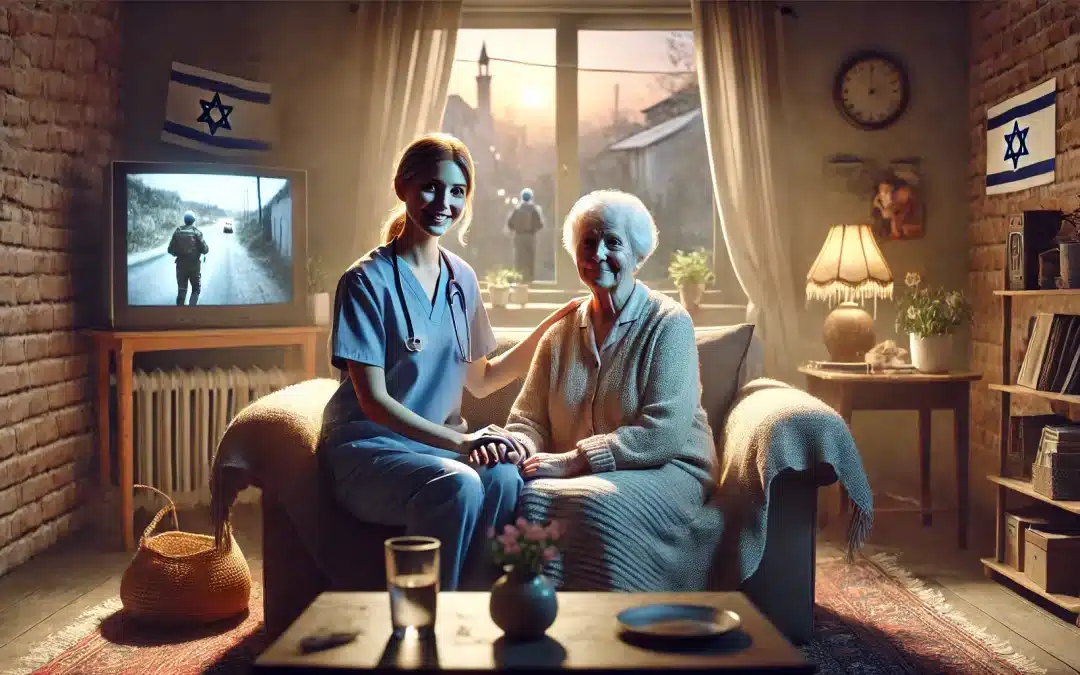
Sep 22, 2024
The ongoing conflict in Israel has created immense challenges, especially for seniors, people with disabilities, and their families. Elderly individuals face heightened risks due to physical vulnerabilities and the emotional toll of living in a constant state of fear and uncertainty. This guide offers practical advice on how to cope with the War in Israel, care for seniors, and access essential support services during this difficult time.
How Seniors and Their Families Can Cope with the Current State of War in Israel
Important Tips at a Glance:
- Stay Prepared: Know your emergency plan and the safest places in your home.
- Keep Emergency Contacts Handy: Have essential numbers accessible at all times.
- Ensure Home Safety: Prevent falls by keeping living spaces clutter-free and well-lit.
- Stay Connected: Regularly communicate with family, friends, or caregivers.
- Use Available Resources: Reach out to organizations that provide assistance.
Cope with the War in Israel by Handling the Emotional State of Seniors
Seniors often feel more vulnerable during times of war, particularly if they live alone or in areas prone to attacks. The lack of access to safe rooms or bomb shelters exacerbates their exposure to dangers like sirens and rockets. Common emotional reactions that do not allow to cope with the war in Israel, include fear, anxiety, depression, and trauma.
Strategies to Manage Emotions:
- Stay Connected:
- Ensure regular phone calls or visits from family members, friends, or volunteers.
- Use video calls to provide face-to-face interaction when physical visits aren’t possible.
- Engage in Activities:
- Encourage hobbies like reading, puzzles, knitting, or listening to music.
- Introduce light exercises or stretching routines suitable for their physical ability.
- Seek Professional Help:
- Access free therapy sessions to help process emotions and deal with trauma.
- Programs like Get Help Israel offer virtual therapy services, including free and subsidized sessions for those affected by the war.
Emergency Emotional Support Contacts that may assists to cope with the war in Israel:
Special Considerations for Individuals with Disabilities and Dementia
People with dementia or disabilities are particularly vulnerable in conflict zones. They may struggle to understand the situation and cope with the war in Israel, leading to increased agitation, confusion, or dangerous behaviors like wandering during sirens.
Key Recommendations:
- Maintain Routine and Provide Reassurance:
- Keep a consistent daily schedule to offer a sense of normalcy.
- Use calming language and reassure them during moments of fear or confusion.
- Ensure a Safe Environment:
- Remove hazards such as loose rugs, electrical cords, and clutter.
- Install safety measures like grab bars in bathrooms and handrails on stairs.
- Provide Physical Assistance:
- Have a caregiver or family member present to help with mobility and evacuation if necessary.
- Use mobility aids like walkers or wheelchairs as needed.
Cope with the War in Israel – Dos and Don’ts: At Home and Outside
When at Home:
- Do:
- Prepare an Emergency Plan: Identify the safest room (preferably a bomb shelter or reinforced area) and practice getting there quickly.
- Keep Essentials Accessible: Have medications, a charged phone, flashlight, water, and non-perishable food within easy reach.
- Prevent Falls: Ensure pathways are clear, use non-slip mats, and keep the home well-lit.
- Don’t:
- Leave Seniors Unattended: Especially if they have cognitive impairments or mobility challenges.
- Overlook Emotional Needs: Ignoring their fears can increase anxiety and stress.
When Outside:
- Do:
- Plan Safe Routes: Know the locations of nearby shelters and avoid areas without protection.
- Stay Informed: Use mobile apps or radios to receive real-time alerts.
- Assist with Mobility: Provide help to those using walkers or wheelchairs to reach safety promptly.
- Don’t:
- Panic: Stay calm to help seniors feel secure.
- Take Unnecessary Risks: Avoid crowded places or areas that may be targeted.
Who to Turn to for Help
Knowing where to seek assistance is crucial during crises.

Emergency Numbers:
Below is a list of essential emergency services and their hotline numbers:
| Service |
Hotline Number |
| Israel Police (Emergency) |
100 |
| Israel Police (Non-Emergency) |
110 |
| Ambulance – Magen David Adom |
101 |
| United Hatzalah |
1221 |
| National Fire and Rescue Authority |
102 |
| Home Front Command (Pikud Ha’Oref) |
104 |
| Israel Electric Corporation |
103 |
| Municipality or Regional Council |
106 |
| ERAN – Emotional Assistance for New Olim |
*3201 |
| NATAL – Israel Trauma and Resiliency Center |
1-800-363-363 |
| Nefesh B’Nefesh (NBN) Answers |
*3680 |
Support Organizations:
Below is a list of organizations that provide various types of assistance to seniors and people with disabilities to cope with the war in Israel:
| Name |
Description and Type of Assistance |
Contact Details |
| Yad Sarah |
Provides medical equipment loans, emergency alarms, transportation services, and home care support |
Phone: 02-644-4455
Website: www.yadsarah.org |
| ERAN |
24/7 emotional support hotline, providing crisis intervention and mental health support |
Phone: 1201
Website: www.eran.org.il |
| Eshel |
Develops and provides services for the elderly, including emergency assistance and support programs |
Phone: 02-655-7128
Website: www.eshelnet.org.il |
| Nefesh B’Nefesh |
Assists elderly immigrants, providing guidance on healthcare, housing, and emergency services |
Phone: 1-866-4-ALIYAH
Website: www.nbn.org.il |
| Reut |
Provides emergency assistance, including food delivery and home care services for the elderly and disabled |
Phone: 03-964-4444
Website: www.reut.org.il |
| Melabev |
Offers support for elderly with dementia, including emergency care and family guidance |
Phone: 02-655-5826
Website: www.melabev.org |
| Access Israel |
Promotes accessibility and provides information on emergency services for people with disabilities |
Phone: 09-744-7814
Website: www.aisrael.org |
| ILAN |
Assists people with neuromuscular disabilities, providing emergency support and equipment |
Phone: 03-524-8141
Website: www.ilan-israel.co.il |
| Magen David Adom |
Emergency medical services, including special assistance for the elderly and disabled |
Emergency: 101
Website: www.mdais.org |
| Home Front Command |
Provides emergency instructions and assistance, including special guidance for the elderly and disabled |
Phone: 104
Website: www.oref.org.il |
Local Municipal Services:
Contact your local authority for assistance with food, medical care, and transportation. Below are contact details for leading local municipalities:
Note: Dialing 106 connects you to the municipal hotline in most cities.
Additional Relevant Information
The Importance of Mental Health Support:
- Long-Term Effects:
- Seniors may experience post-traumatic stress even after immediate dangers have passed.
- Supportive Programs:
- Organizations like JDC’s Supportive Community provide not only physical care but also social activities that promote emotional resilience.
Preventing Falls and Injuries:
- Home Modifications:
- Install handrails, grab bars, and non-slip flooring.
- Ensure adequate lighting throughout the home.
- Assistive Devices:
- Use canes, walkers, or wheelchairs as needed.
- Regular Health Checks:
- Monitor vision and hearing, as impairments can increase fall risk.
- Physical Activity:
- Engage in exercises to improve balance and strength, as recommended by a healthcare provider.
How We Can Help
At Happy Seniors, we understand the emotional and physical challenges seniors face during times of crisis. Our services are designed to provide comprehensive support and help to cope with the war in Israel:
- Emotional Support:
- Regular check-ins and compassionate conversations to ease anxiety and loneliness.
- Physical Assistance:
- Trained social worker to visit and provide assistance.
- Customized Care Plans:
- Tailored services to meet individual needs, from daily tasks to companionship.
Contact Us:
If you or a loved one needs help, don’t hesitate to reach out. We’re here to support you during these challenging times.
By staying informed and utilizing available resources, seniors and their families can better navigate the current situation, ensuring safety, well-being, and peace of mind. Remember, you are not alone—help is just a phone call away.
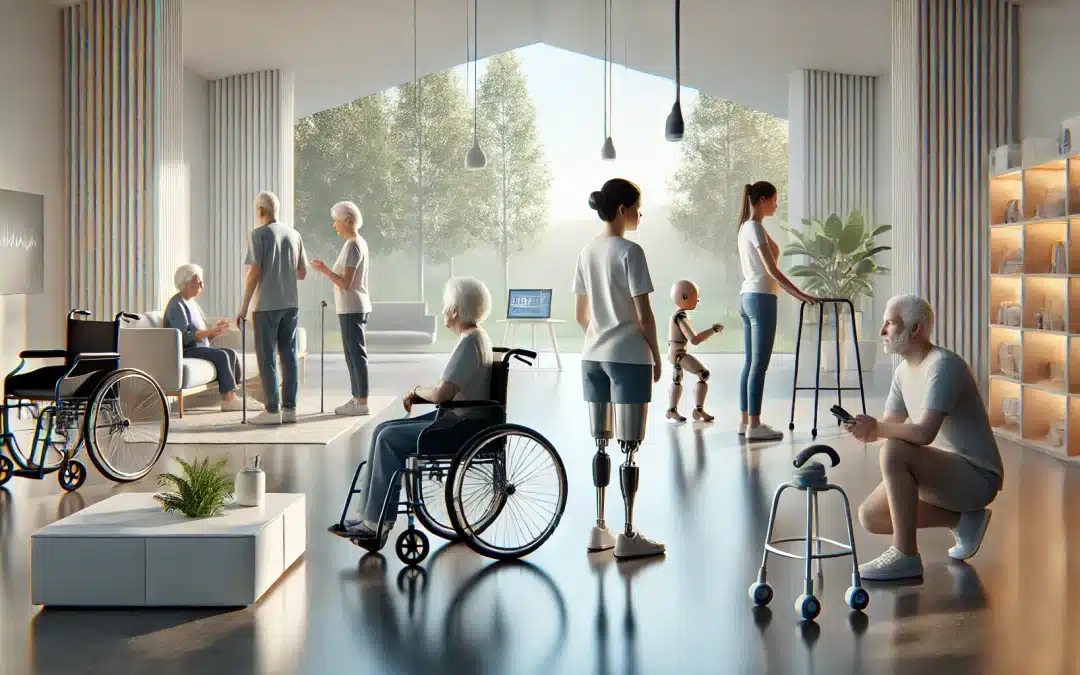
Sep 11, 2024
Many people in Israel are unaware of the full range of benefits and subsidies they are entitled to when it comes to Medical Accessories in Israel and assistive products. As a result, individuals often leave significant amounts of money and benefits “on the table” or pay out of pocket for products that could have been covered by government programs or insurance.
A 2019 study by the Taub Center for Social Policy Studies in Israel found that nearly 30% of eligible individuals do not fully utilize their healthcare benefits due to lack of awareness or difficulty navigating the system. Furthermore, a 2020 report by the Israeli Ministry of Health estimated that up to 40% of seniors and disabled individuals may be missing out on some form of assistance they’re entitled to, potentially leaving thousands of shekels unclaimed.
This comprehensive guide aims to help senior citizens, people with disabilities, soldiers, and war victims understand and access the resources available to them, potentially saving thousands of shekels annually and improving their quality of life.
Most Sought-After Medical Accessories in Israel
The following medical Accessories in Israel are commonly subsidized for seniors, disabled individuals, and veterans in Israel:
- Hearing aids: Critical for individuals with hearing loss.
- Mobility devices: Wheelchairs, walkers, scooters, and crutches.
- Prosthetics and orthotics: Prosthetic limbs and orthopedic braces.
- Vision aids: Magnifiers and specialized glasses.
- Communication devices: Tools for speech-impaired individuals.
- Rehabilitation equipment: Electric beds, lifts, and pressure-relief mattresses.
Eligibility Criteria
Eligible Groups:
The following groups are typically eligible for subsidized Medical Accessories in Israel:
- Senior citizens (usually 65+): Individuals who have reached retirement age and may require additional medical support. Those registered with the National Insurance Institute (Bituach Leumi) are often eligible for assistance with products like hearing aids, wheelchairs, and other assistive devices
- Individuals with recognized permanent disabilities: Those with long-term physical, mental, intellectual, or sensory impairments that affect their daily activities. Eligibility is typically verified by medical documentation and government certifications from the Ministry of Health or National Insurance.
- Soldiers and veterans (injured during service): Current and former military personnel who sustained injuries while serving in the Israel Defense Forces (IDF). They are often eligible for full assistance, including advanced rehabilitation equipment.
- Victims of war and terror attacks: Civilians who have been injured or affected by acts of war or terrorism may receive special aid through various government programs.
Who is Not Eligible (covered under other programs) to Medical Accessories in Israel:
While many groups receive comprehensive coverage, certain individuals are covered by alternative programs. These include:
- Work accident victims: Those injured at work are typically covered under work accident insurance, and should apply for benefits via Bituach Leumi’s work injury program (work injury benefits).
- Disabled IDF veterans: Veterans with service-related disabilities are covered by the Ministry of Defense’s Rehabilitation Division (Rehabilitation Division).
- Holocaust survivors: Individuals receiving compensation through the Ministry of Finance for Holocaust-related disabilities, including allowances for camp or ghetto survivors, may not be eligible for additional subsidies under other programs.
Each of these specialized groups has access to specific programs that provide benefits tailored to their circumstances.
Organizations Providing Subsidies and Funding Assistance
The amount of funding available for assistive products varies depending on the program and individual eligibility. Below are state-mandated health services, non-profits, and government agencies that provide subsidies for Medical Accessories in Israel.
State-Mandated Health Funds (HMOs):
Supplementary health insurance plans within Israel’s health funds (Clalit, Maccabi, Meuhedet, Leumit) often reimburse a large portion of costs, with up to 75% coverage for devices like hearing aids and mobility aids, though caps apply to the reimbursement amounts.
- Clalit Health Services (website)
- Example: For hearing aids, a referral from a Clalit doctor is needed. Reimbursement of up to 75% of the cost (max NIS 1,100 per year) can be applied for after purchasing from an approved list.
- Maccabi Healthcare Services (website)
- Example: Mobility aids like crutches or walkers can be partially subsidized after providing documentation from a specialist.
- Meuhedet Health Services (website)
- Example: Members can apply for prosthetic limbs with 80% coverage, depending on their health plan tier.
- Leumit Health Services (website)
- Example: Vision aids such as specialized glasses are covered for seniors and those with visual impairments.
Non-Profit Organizations:
- Yad Sarah (website) – Provides free or low-cost equipment loans (e.g., wheelchairs, oxygen machines). Simple application through any of their 100 branches.
- Milbat (website) – Specializes in technological solutions for disabled individuals. Offers customization based on individual needs after consultation.
- Ezer Mizion (website) – Provides medical equipment, specifically for low-income families. Application is done through social workers and requires medical records.
- Ezra Lemarpeh (website) – Offers rehabilitation equipment and loans. Applications are evaluated based on medical necessity.
- Ilan – Israel Foundation for Handicapped Children (website) – Assists children and young adults with physical disabilities in obtaining accessories like mobility devices.
Government Agencies:
- Ministry of Health (website) – Offers up to 75-90% funding for necessary devices like mobility aids, prosthetics, and specialized equipment. The funding is determined by the type of product and the individual’s financial and medical status.
- National Insurance Institute (Bituach Leumi) (website) – For home-based care and medical equipment, subsidies can range from partial to full coverage depending on the type of equipment and financial status of the applicant. For instance, those receiving a Gmila B’Kesef (cash benefit) may apply their benefit towards purchasing assistive products.
- Ministry of Defense (website) – Covers 100% of rehabilitation equipment costs for soldiers and veterans. Requires medical evaluation through the Rehabilitation Division.
Application Processes: Specific Examples
Clalit Health Services (Hearing Aids):
- Obtain a referral from a Clalit doctor.
- Purchase the hearing aid from a pre-approved supplier.
- Submit the original invoice and doctor’s referral for reimbursement.
- Receive up to 75% reimbursement, capped at NIS 1,100 annually.

Ministry of Health (Mobility Devices):
- Get a specialist’s recommendation.
- Submit documents through your local health office.
- Choose a supplier from an approved list.
- The equipment will be inspected after delivery to ensure it meets your needs.
Yad Sarah (Wheelchairs):
- Visit a Yad Sarah branch with ID and medical documentation.
- Loan a wheelchair for a limited period, with the option to extend.
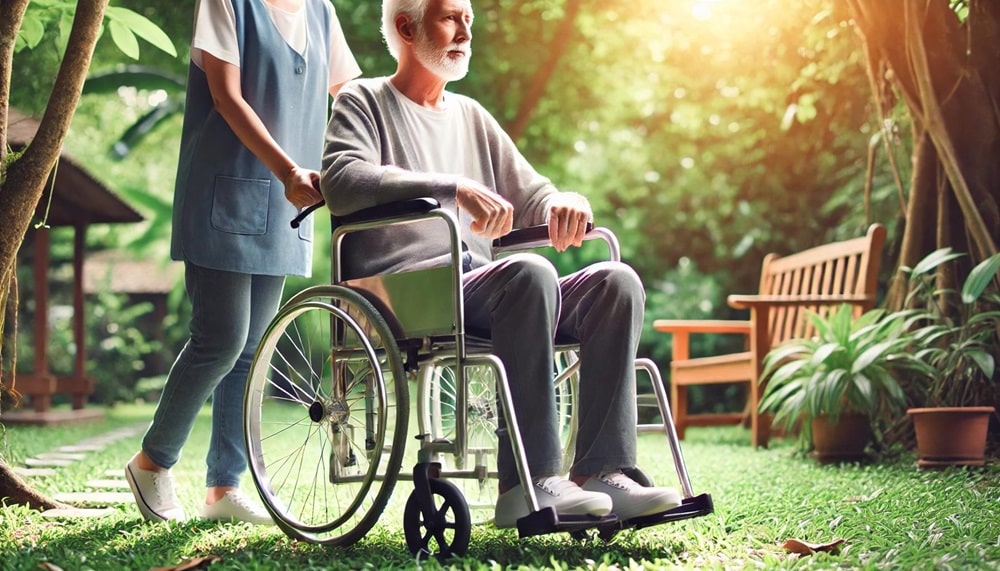
Funding Assistance
- Bituach Leumi offers Gmila B’Kesef (Cash Benefit) to cover home-based care and Medical Accessories in Israel. The amount varies based on the level of assistance required, ranging from approximately 1,000 to 5,000 NIS per month for severe cases.
- Ministry of Health provides up to 75-90% coverage for necessary devices like mobility aids, prosthetics, and specialized equipment. For those with financial difficulties, coverage can be up to 90%. For example, they may cover up to 4,000 NIS for a standard wheelchair or up to 20,000 NIS for a high-end electric wheelchair, depending on the individual’s needs and financial situation.
- Private Insurance may help reduce co-payment costs for certain accessories. Coverage can range from 50% to 80% of the cost, depending on the policy and the specific accessory.
The exact amount of funding varies greatly depending on the individual’s circumstances, the specific accessory needed, and the organization providing the assistance. It’s crucial to check with each relevant organization for the most up-to-date information on funding amounts.
Role of Insurance
In Israel, supplementary health insurance through your HMO can significantly reduce out-of-pocket expenses for Medical Accessories in Israel. Here’s how to maximize your insurance benefits:
- Review your policy: Carefully read your supplementary insurance policy to understand what’s covered and to what extent.
- Pre-approval: Many insurers require pre-approval for coverage of Medical Accessories in Israel. Contact your insurance provider before making a purchase to ensure you follow the correct procedures.
- Network providers: Some insurers have agreements with specific suppliers. Using these network providers can often result in higher coverage or lower co-payments.
- Combine benefits: In some cases, you can combine benefits from your HMO’s supplementary insurance with government subsidies to minimize your out-of-pocket expenses.
- Annual limits: Be aware of any annual limits on coverage for Medical Accessories in Israel. Plan your purchases accordingly to maximize your benefits.
- Appeals process: If a claim is denied, don’t hesitate to appeal the decision. Provide additional medical documentation to support your need for the accessory.
- Waiting periods: Some plans may require a waiting period before benefits can be utilized. Be sure to understand these restrictions when planning your purchases.
Many insurers offer extended coverage for high-cost items like electric beds, hearing aids, and customized prosthetics. For example, some policies may cover up to 80% of the cost of hearing aids every three years, or provide allowances of 10,000-20,000 NIS for major mobility devices.
Some private insurance plans go beyond what state-provided supplementary insurance offers, covering advanced assistive technologies like motorized wheelchairs or specialized communication devices for people with disabilities.
Remember, insurance policies can be complex. Don’t hesitate to ask your insurance provider for clarification or seek assistance from patient advocacy organizations.
Summary Table of Key Organizations
| Organization |
Pros |
Cons |
Application Process Summary |
| Clalit Health |
Extensive coverage; easy application |
Co-payment required for most accessories |
Doctor referral → Purchase → Reimbursement request |
| Maccabi Health |
Competitive rates; good customer service |
Limited to HMO network; some co-payments |
Specialist referral → Submit documents for subsidy |
| Yad Sarah |
Free/low-cost equipment loans; large network |
Equipment must be returned after use |
Visit branch with medical documents → Loan for limited time |
| Ezra Lemarpeh |
Good range of rehabilitation equipment |
Resources may be limited for some items |
Contact directly with medical documentation |
| Milbat |
Customized technological solutions |
Consultation required; can take time |
Apply online → Assessment → Customization and delivery |
| Ministry of Health |
Wide range of devices covered |
Process can be bureaucratic; long approval times |
Specialist recommendation → Local health office → Approval |
Conclusion
Navigating the system of subsidies and assistance for medical accessories in Israel can be complex and time-consuming. Unfortunately, this complexity often results in many eligible individuals not fully utilizing their benefits. Studies show that this lack of awareness leads to unnecessary financial strain for many families, and better knowledge of available benefits could save them thousands of shekels annually.
This underutilization can have significant impacts on quality of life. For instance, a person who needs a high-quality hearing aid but is unaware of available subsidies might opt for a lower-quality device or go without, potentially affecting their social interactions and overall well-being.
At Happy Seniors, we understand these challenges and are committed to helping you optimize your benefits. Our team of experts can assist you in:
- Determining your eligibility for various subsidies and assistance programs
- Navigating the application processes for different organizations
- Appealing denied claims or rejected applications
- Maximizing your insurance benefits
- Finding the most cost-effective solutions for your Medical Accessories in Israel needs
Happy Seniors provides a comprehensive range of services to support every step of your journey. These services include:
- Assistance in finding qualified nursing caregivers
- Managing medical monitoring and personal care
- Addressing daily challenges
- Offering cutting-edge technological solutions that keep the elderly connected with their families and engaged with their communities
Our goal is to help seniors age in a familiar, comfortable environment. By combining personalized care with advanced technology, Happy Seniors ensures that seniors receive the support they need to live comfortably and independently, greatly improving their overall well-being.
Remember, these subsidies and assistance programs exist to improve your quality of life. Don’t leave your benefits unclaimed. Whether through state health funds, non-profits like Yad Sarah, or government programs, there are numerous options to help seniors, people with disabilities, and veterans access necessary equipment.
Always check current policies and procedures to ensure you receive the full benefits available to you. And if you need help, don’t hesitate to reach out to Happy Seniors. We’re here to ensure you get the support you deserve, simplifying the process and helping you save both time and money.
Contact Happy Seniors today and let us assist you in navigating the complex world of Medical Accessories in Israel subsidies and benefits in Israel!





